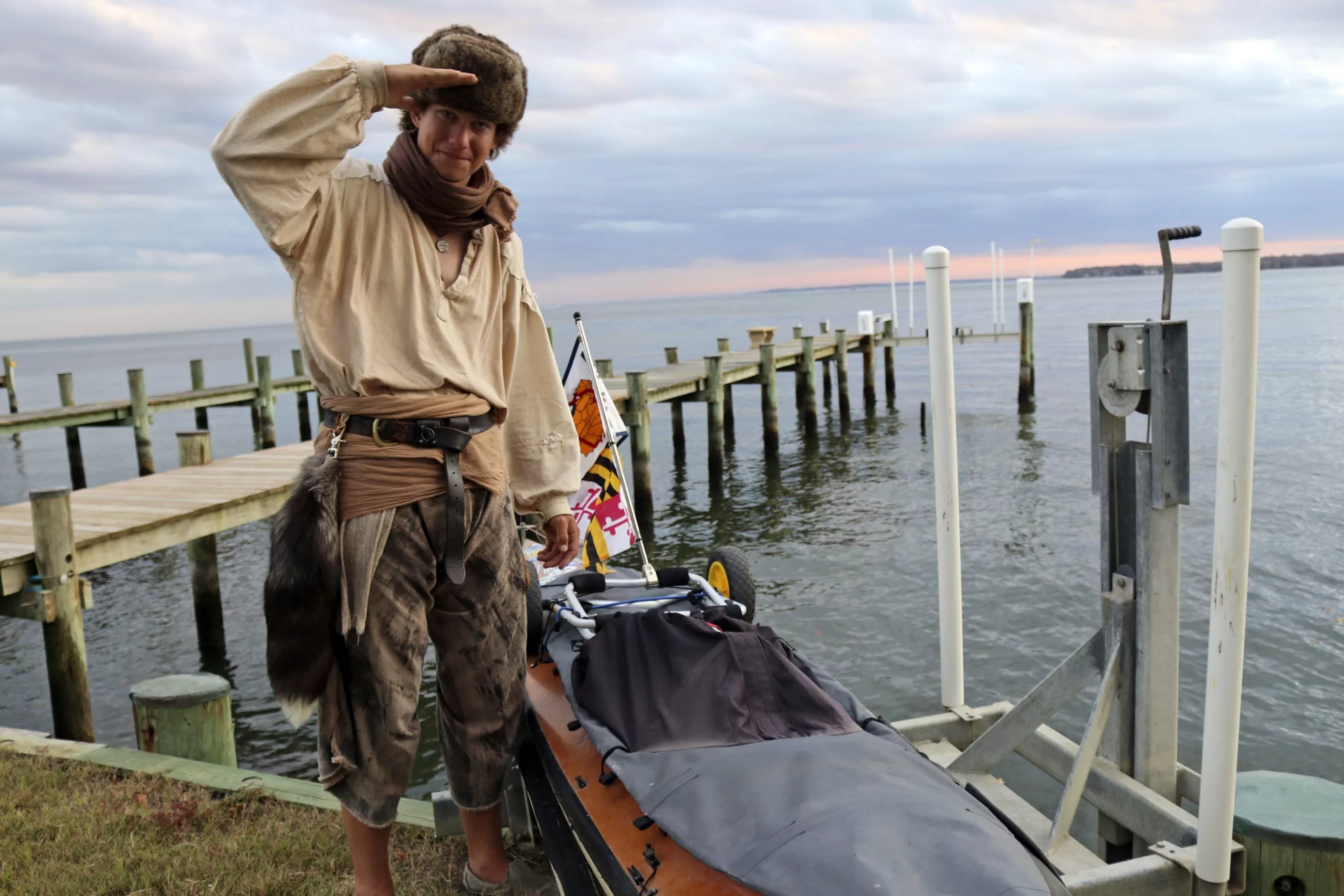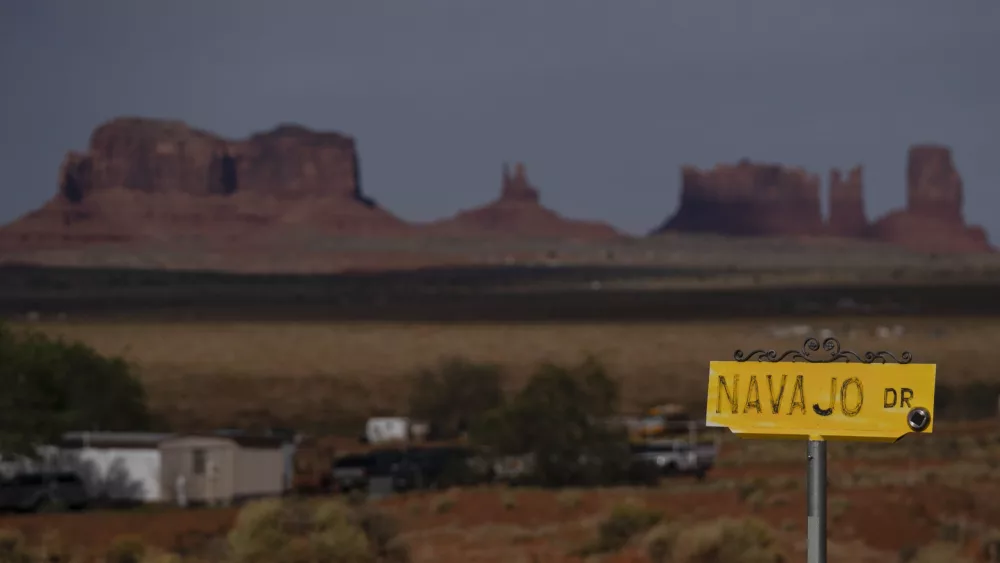ANNAPOLIS, Md. (AP) — Peter Frank has paddled from Michigan’s Upper Peninsula in June to the Chesapeake Bay in Maryland this month in his 1982 Sawyer Loon decked canoe, but he’s still got a long way to go.
The 23-year-old is about a quarter of the way on his planned journey of roughly 6,000 miles (9,656 kilometers) to complete the Great Loop route. This continuous watercourse includes part of the Atlantic and Gulf intracoastal waterways, the Great Lakes, part of Canadian Heritage Canals and inland U.S. rivers.
For Frank, the voyage is largely a way to express his gratitude for still being alive and having the ability to take on the physical challenge, almost a decade after a car accident left him with 14 broken bones and nearly paralyzed. He had been hiding in a pile of leaves to surprise a friend when a carful of teens drove through the pile without knowing he was there.
“It’s my form of showing the appreciation for being alive and being able to walk and do the things that I can do,” he says during a break in Annapolis, Maryland, earlier this month, a day before setting out again.
He also enjoys writing about his experiences on his blog and meeting people along the way.
“I’m grateful to be out here and to share this story,” Frank says. “In some regard, I feel that I have a responsibility to document the things that I experience for people who don’t get to experience them or that dream of experiencing them. That is why it’s important to me.”
Clad in a rabbit-fur hat and clothes he made himself to resemble a pirate, he generally paddles between six and 10 hours a day in his 1982 decked vessel, its shell hollowed to stow supplies. Many nights, he sleeps in a tent by the water. However, he often gets invitations from readers of his blog to stay in their homes.
To keep warm, he’s picked up a 1970s vintage heavy down coat, an ultra-light Patagonia jacket he found in a thrift store, 1950s German military cold weather mittens, a set of warm thermals, and several wool socks. Recently, when he felt underdressed, he designed and sewed his own pants that he quilted over cotton flannel for extra layering.
He carries 10 portable power banks, plus cords and outlet plugs. He says his electronics bag alone, holding only batteries and cords, weighs almost 25 lbs.
“I find that 10 is a good amount and will keep me charged on GPS, radio, cameras and phone battery through any predicament,” he says. “I also carry a solar panel as a backup and can charge almost anything I need.”
He doesn’t carry much for self-defense: only a small filet knife for fish and a pocket knife for cutting rope. Frank says he’s confident in his ability to protect himself, such as being mindful in bear country, tying up food, or simply avoiding populated areas.
“In the long run, it’s never been much of a concern, and anything beyond my control isn’t something I can prevent with anything I can take with me,” he says.
The Eagle Scout, who still visits with a local scout troop in his hometown, has prepared a hearty portion of his food for the long adventure. He dehydrated game meat and ground beef in an oven and vacuum-sealed it for the trek.
Frank earns some income by writing about his experience. His blog also helps him pay grocery bills via his “Rotisserie Chicken Fund,” where people can click to send him money.
“Every now and then, somebody will send me $20 online, which helps out a lot for like food and stuff, but in the meantime, I also write for magazines, and the magazines will publish my work,” he says.
Frank has made long-distance trips by bicycle, unicycle and canoes before. For example, he’s already explored Florida by canoe, which took him about 11 months, ending in May 2023. That’s a significant portion of what he’s trying to do now. He knows he’ll eventually tie his canoe to mangroves during one stretch to sleep.
“I really, really do enjoy them,” Frank says of the adventures. “I enjoy being alive most of all, and so I guess for me these expeditions are not only my college and my education, but it’s also my form of worship in a way, my giving thanks to the world for being alive and being able to walk.”
The Great Loop is his most challenging trip yet. While the journey is a bucket-list route for avid boaters, it’s rarely done with reliance on muscling a canoe.
Frank also travels clockwise, which he says is the harder route because he’s paddling against the current on inland rivers for more than 25% of the trip.
Frank launched his trip on June 27 in Escanaba, Michigan, where he’s from. He paddled into Canada and crossed Lake Ontario, where he camped on islands. On his way south, he went through New York City, floating by the Statue of Liberty.
While he’s given some long study to the Great Loop route, not everything has been perfectly mapped out for the canoeist. He says he’s had to do some wayfinding on his own.
While leaving New York, he took the Delaware and Raritan Canal, using portages he says he found on his own that weren’t mentioned in route plans he had seen previously. Frank says he hopes to write an informational guide to fill in some gaps about details of the route. He’s also thinking about writing an autobiography.
“I’d like to put something together that’s purely educational that would be a guide, and then I’d like to put something together that’s kind of like the story of a young man finding himself in a world that he doesn’t fully understand yet,” Frank says.
He was living with his parents before he started traveling when he left home to unicycle across the United States for charity when he was 19.
“I’ll sometimes go back and visit for a couple of months between expeditions, but for the last three years I’ve just been traveling full time,” he says.
Everything he owns is in his canoe.
He says he doesn’t need much money to keep on flowing.
“Contrary to what most people think, it doesn’t cost a tremendous amount to travel, especially when you eliminate plane tickets, gas, assets and accommodations like hotels and restaurants,” he says.
He’s never had a lot of money, and he’s done previous expeditions with less than $1,000.
“Is this comfortable or practical? Absolutely not, but through the struggles of following my dreams with little to nothing, I’ve developed the capacity to enjoy less, and as a result, I live well with little,” he says.
He also describes the trip as a voyage in self-discovery.
“It’s very hard to picture where I will be three years from now, as I’m still young and growing, but I’m hoping that on this journey, this very long journey of self-discovery, I’ll perhaps find that,” he says.
He estimates it will take roughly 17 months to finish the loop. He’ll need to complete it by next November, he says, due to a natural deadline set by the freezing of the lakes he’ll need to cross.
“I would say that nature is my biggest competitor, most definitely,” Frank says.
Brought to you by www.srnnews.com








